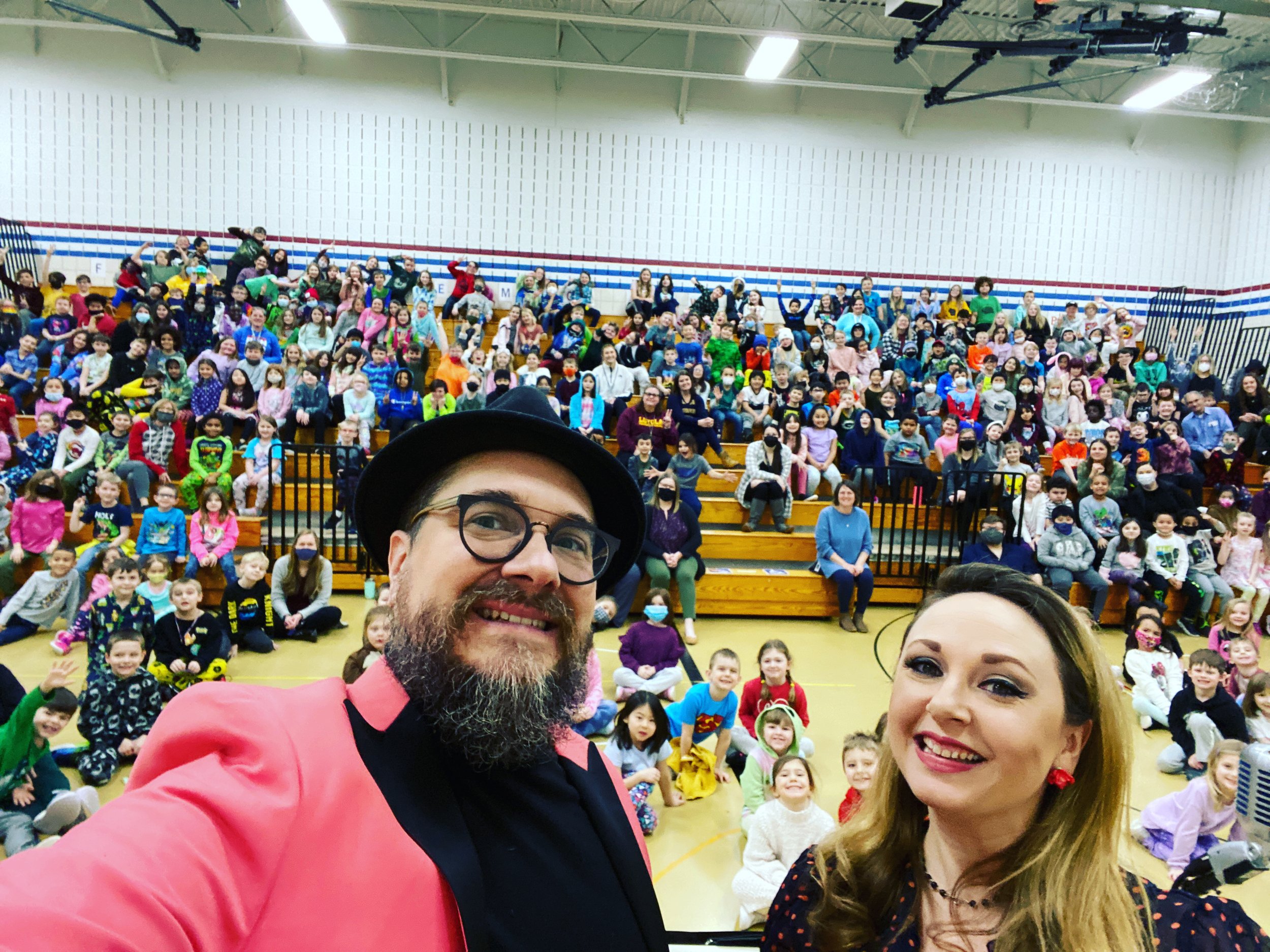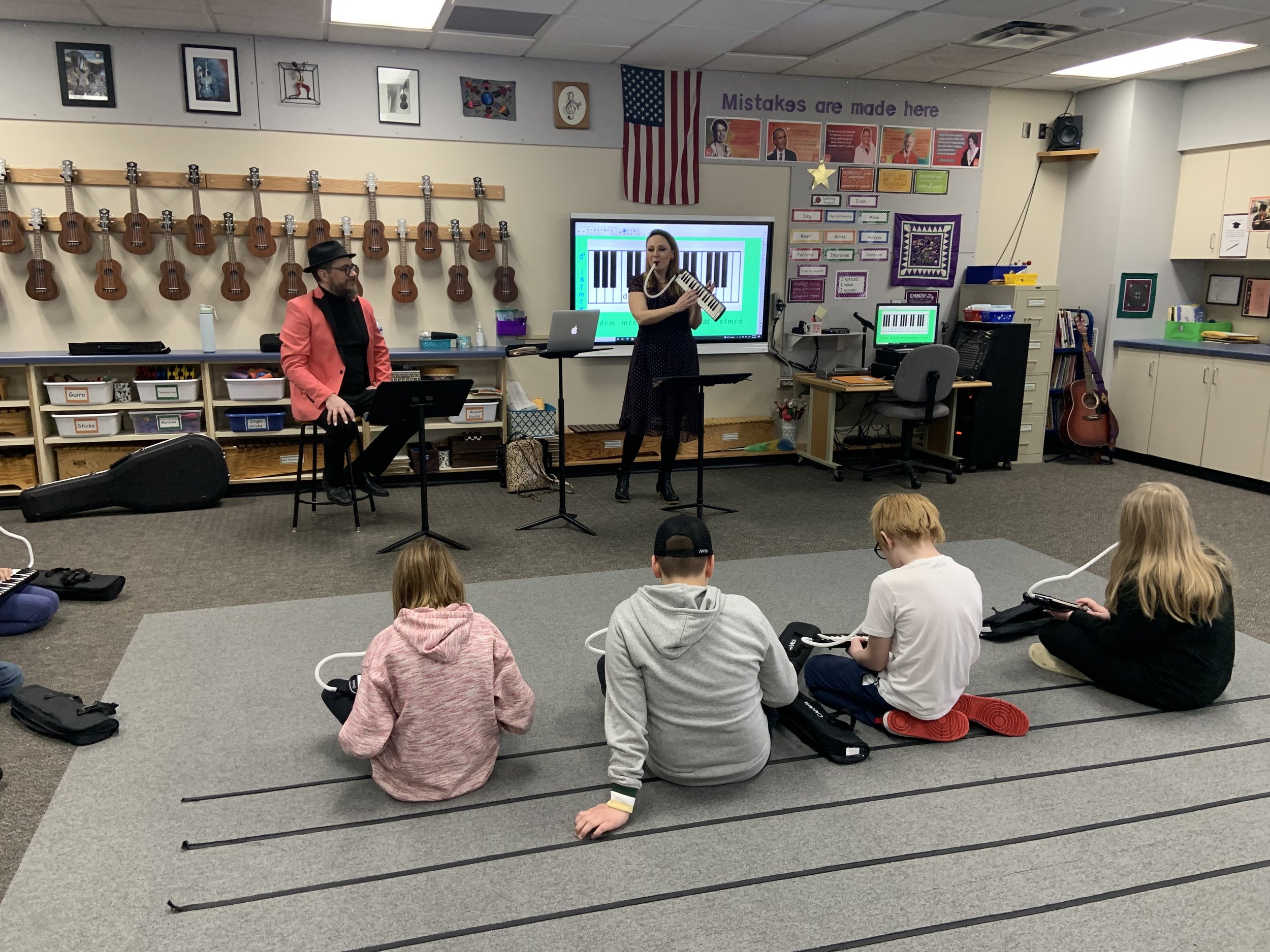OUTREACH
Our outreach programs are catered and tailored to fit the needs of each community. We have worked with student groups with ages ranging from 5-25 specifically focusing on jazz, improvisation, origins and performance. One outreach program is included with a community concert booking.
To build a custom program based on student/community needs, please contact us at booksundae@gmail.com
— Kate Voss and Jason Goessl
School “Informance”
Part performance, part educational, this assembly style event uses elements from Sundae + Mr. Goessl’s show mixed in with information about the instruments and technology they use and about the songwriters and innovators from early American music. At the end, Sundae + Mr. Goessl open up the floor for Q & A giving students and teachers an opportunity to ask questions. The “informance” can be K-12 or targeted age groups and usually lasts between 30-45 mins.
Senior Facility Performance
This nostalgic packed performance hits the mark with seniors and care providers alike as Sundae + Mr. Goessl showcase the Great American Songbook’s most cherished songs. With this one hour set, we perform all the classics (no originals) and encourage folks to sing along. Set list includes songs like “La Vie En Rose”, “Young At Heart”, and “Blue Bayou”.
Melodica Group Class
(45-60mins) Designed for any age and skill level, this class can be conducted in many different scenarios from an in-school group class to an after-school community program. (no age limit)
1. Demonstration of instrument and how it works (~10 minutes)
Teacher will have an open melodica to show students how the reeds function to produce sound.
Teacher will demonstrate how to make play instrument and briefly explain origins and the different styles of music that incorporate melodica
2. Group lesson (~30-40 minutes)
Students will learn about breathing techniques, fundamentals on the keyboard, rhythmic patterns and eventually a song that the group can play together.
We provide melodicas at cost and teach basic level, piano-based musical concepts, breathing techniques and simple songs to practice. Plus students get to keep their melodicas!
Stage Presence (45 mins) This class can be conducted to targeted ages or K-12.
1. Proper Performance etiquette explanation and examples (~15 mins)
Teachers will touch on many performance dos and donts going over subjects including eye contact, confidence, dress, demeanor, practice techniques, mic techniques, getting through stage fright.
2. Student Volunteers (~15 mins)
Teachers will enlist student volunteers to perform specific examples of “good” performance techniques and “needs improvement” performance techniques.
At this time we will also go over concert etiquette and teach the dos and donts for audience members.
3. Teacher Demonstration (~15 mins)
Teachers will perform 2 songs and students will critique them via discussion after the performance and/or written evaluation form (depending on age and writing skills).
Students will learn proper concert etiquette for attendees and performers. Students will get tips on overcoming stage fright and practical application for self-critique and improvement.
The Student Volunteer portion is a really fun way to get students involved in the lecture. This is also helpful for shy students wanting stage time and a good lesson in encouragement from fellow students via audience etiquette.
Evaluation forms can be kept by students to reference for future events.
Jazz Improvisation Techniques and Application
(60-120 mins) This class is designed for students with 3+ years experience on their instrument/voice. Jazz background is not required.
1. Demonstrations and lecture (~20 minutes)
Teachers will play recordings of different styles of improvisation including Dixieland, Bebop, Modal and free form from 1920-present.
Teachers will play examples of different types of improv on their instruments using and explaining techniques including call and response, off-melody, rhythmic phrasing, licks, repetition, scales and modes.
2. Student Adjudication (~30-60 minutes depending on class size)
Each student will have the chance to work one-on-one with the teacher and practice the different types of soloing. The teacher will critique and have open discussions with student body about the process.
3. Improv Jam (~20 minutes)
Students use newly learned techniques to solo over teacher appointed tune. Each student will be given several choruses to improvise over going from one to another without stopping. Teachers will supervise and often encourage students to trade 4’s or 8’s playing off one another.
Students will be expected to participate in adjudication and/or improv jam. Other students are welcome to sit in on the class and observe. Students who choose to observe the class are still welcome to participate in discussions and are encouraged to ask questions.
For students participating, this is a great way for them to get targeted productive criticism and encouragement from professional musicians. Students will also get a chance to play with their peers, enhancing their ability to collaborate with others and communicate through music more fluidly.
For students observing, this is a great opportunity for younger, aspiring musicians to get a feel for what jazz improv is about. It’s also a chance for the students who may be too shy to perform in front of others to learn more about jazz improv and are encouraged to take notes and ask questions.
Songwriting and Recording
(75 mins) This program can be taught to groups of kids ages 5-7, 8-10, 11-13 and 14-18.
1. Demonstration and Explanation (~15 minutes)
Teachers play a recorded song, discuss techniques used.
Teachers record a song live and play back. Discuss several elements including technique, critique and creative choices.
Go over basics of how recording program works
2. Songwriting with participation and input from students (~30 minutes)
Start with a basic form (blues, AABA)*
Fill-in-the-blank lyrics with be chosen by students.*
Rhythmic, melodic and call-back elements will be created and performed by students with collaborative efforts from each other and teachers.
*(More sophisticated song-writing techniques can be used with advanced classes.)
3. Record the song (~30 minutes)
Teachers will demonstrate the basics of the recording program and start laying down each track. Students will participate in performance and the actual recording of each track as “engineer”.
Students are expected to learn the basics of the recording program “Garage Band” including tracking, plug-ins and mic technique. Advanced groups may also get into mixing, EQ and fine-tuning.
Students are expected to collaborate with each other and teachers during the song-writing process. Everyone will get a chance to voice their opinions and everyone will get a chance to perform on the recording whether in a group setting or solo.
The school will be left with an MP3 of the final product giving each student and faculty member access to a copy of the original song as a memento and to share with family and friends.
Programs, Councils and communities we’ve worked with in the past:
Live On Stage
Mineral County Performing Arts Council
IMTour
Arts NW
Folk Alliance International
4Culture
Eckroth Music
Ronan High School
Dixon School
Polson High School
Mission Valley Live
Northwest Arts Network
Kootenai Heritage Council
Judith Arts Society
Sanders County Arts Council
Sunburst Foundation
Las-Vegas Clark County Library District
St. Joseph’s Assisted Living Facility
Evergreen Retirement Facility
University of Wisconsin - Oshkosh
Cadenza Arts
West Side Music Academy
Mode Music
The Grand Oshkosh
Midland University
Ted Brown Music
Eau Claire School of Music
Denmark Elementary School
Angell Park Senior Apartments
Allied Concert Services
G.L. Berg Entertainment
Haines Arts Council
Eau Claire Area School District
Del Norte Association for Cultural Awareness
Clatskanie Arts Commission
Community Concerts of Treasure Valley
Alaska Bear Fest
Valdez Arts Council
Skagway Arts Council
Petersburg Arts Council
SouthWest Alaska Arts Group

